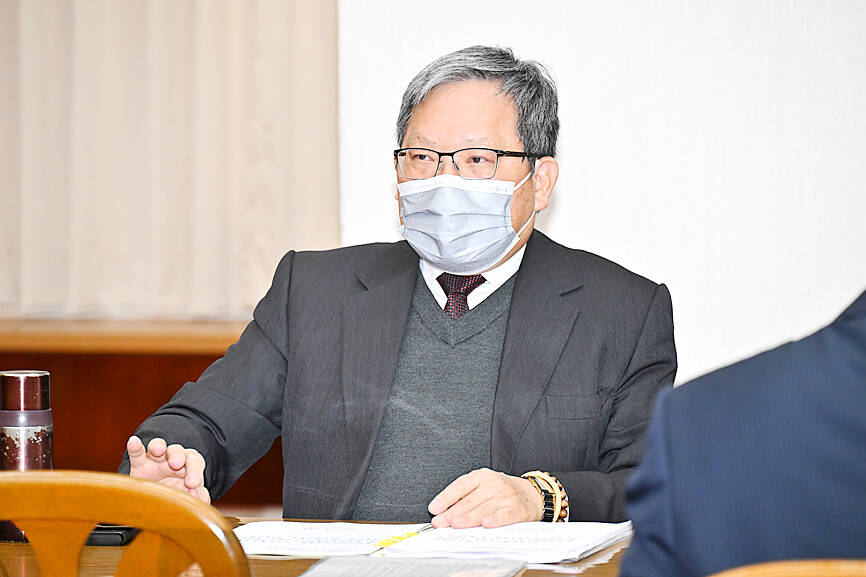The legislature’s Finance Committee yesterday approved bills seeking to extend by four years tax cuts for people replacing diesel-fuel trucks in a bid to reduce air pollution and carbon emissions.
The bills, which need to pass second and third readings in the legislature, would extend a tax cut of up to NT$400,000 on purchases of new trucks to replace diesel-fuel vehicles until the end of 2026.
Ruling and opposition legislators forwent cross-party discussions to speed up the passage of the bills, as the tax cut is set to expire at the end of this month.

Photo: Tu Chien-jung, Taipei Times
Policymakers said there is still need for the tax reduction, first introduced in August 2017, as about 78,000 aging diesel trucks remain on the roads and should be replaced, an Environmental Protection Administration estimate showed.
The proposed revisions aim to save energy, curb carbon emissions and improve air quality without adding financial burdens on taxpayers, the Cabinet has said.
Sales taxes are expected to miss the budget target this year due to this and other tax cuts to help stabilize consumer prices, the Ministry of Finance has said.
Separately, Minister of Finance Su Jain-rong (蘇建榮) said he would discuss with state-run banks about whether to extend preferential interest rates on purchases of first homes by young people.
Despite preferential interest rates, mortgages among young people have declined in the past few years even though overall mortgage operations continue to expand, legislators said.

Taiwan’s foreign exchange reserves hit a record high at the end of last month, surpassing the US$600 billion mark for the first time, the central bank said yesterday. Last month, the country’s foreign exchange reserves rose US$5.51 billion from a month earlier to reach US$602.94 billion due to an increase in returns from the central bank’s portfolio management, the movement of other foreign currencies in the portfolio against the US dollar and the bank’s efforts to smooth the volatility of the New Taiwan dollar. Department of Foreign Exchange Director-General Eugene Tsai (蔡炯民)said a rate cut cycle launched by the US Federal Reserve

Handset camera lens maker Largan Precision Co (大立光) on Sunday reported a 6.71 percent year-on-year decline in revenue for the third quarter, despite revenue last month hitting the highest level in 11 months. Third-quarter revenue was NT$17.68 billion (US$581.2 million), compared with NT$18.95 billion a year earlier, the company said in a statement. The figure was in line with Yuanta Securities Investment Consulting Co’s (元大投顧) forecast of NT$17.9 billion, but missed the market consensus estimate of NT$18.97 billion. The third-quarter revenue was a 51.44 percent increase from NT$11.67 billion in the second quarter, as the quarter is usually the peak

The US government on Wednesday sanctioned more than two dozen companies in China, Turkey and the United Arab Emirates, including offshoots of a US chip firm, accusing the businesses of providing illicit support to Iran’s military or proxies. The US Department of Commerce included two subsidiaries of US-based chip distributor Arrow Electronics Inc (艾睿電子) on its so-called entity list published on the federal register for facilitating purchases by Iran’s proxies of US tech. Arrow spokesman John Hourigan said that the subsidiaries have been operating in full compliance with US export control regulations and his company is discussing with the US Bureau of

Pegatron Corp (和碩), a key assembler of Apple Inc’s iPhones, on Thursday reported a 12.3 percent year-on-year decline in revenue for last quarter to NT$257.86 billion (US$8.44 billion), but it expects revenue to improve in the second half on traditional holiday demand. The fourth quarter is usually the peak season for its communications products, a company official said on condition of anonymity. As Apple released its new iPhone 17 series early last month, sales in the communications segment rose sequentially last month, the official said. Shipments to Apple have been stable and in line with earlier expectations, they said. Pegatron shipped 2.4 million notebook